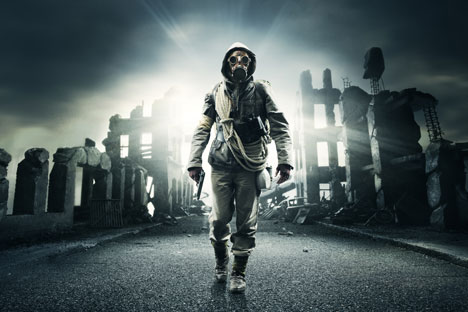
Post-apocalyptic fantasy by Russian dystopia writers. Source: Shutterstock
Although North Korea is one of the last outposts of
Historically, the genre of utopia/dystopia has been under-represented in Russian literature. There is Chernyshevsky’s “What Is To Be Done?” Zamyatin’s “We,” works by the Strugatsky brothers and Platonov, but not much more.
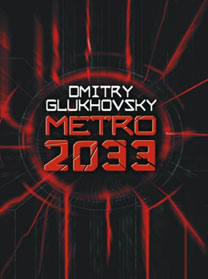 |
| Source: Amazon.com |
However, that all changed with the fall of the Soviet
1) “Metro 2033” Dmitry Glukhovsky
Glukhovsky’s post-apocalyptic debut novel was a bestseller when it came out in Russia in 2007 and was made into a very popular computer game. Its sequel, “Metro 2034,” was equally successful. The Metro Universe is set in a post-nuclear Earth with the remaining survivors lurking in subterranean tunnels. The biggest is the Moscow Metro, where all the stations are like mini-countries and chaos reigns in the dark tunnels themselves.
2) “Rabbits and Boa Constrictors” Fazil Iskander
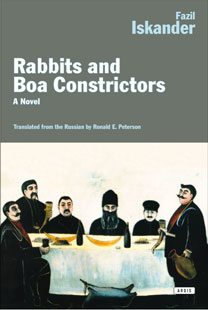 |
| Source: Amazon.com |
Abkhazian writer Fazil Iskander has written modern classics of both Soviet and Russian literature and is known for his unparalleled humor and satire.
His novella “Rabbits and Boa Constrictors” is a fairytale allegory of the Russian state, whose notorious figures are recognizable in these rabbits,
3) “Escape Hatch” Vladimir Makanin
 |
| Source: Amazon.com |
Vladimir Makanin’s “Escape Hatch” is a novella that juxtaposes two worlds.
The first is the intelligentsia’s fragile refuge – an underground bunker – while the rest of the world is the overground city, devastated by
4) “The Day of the Oprichnik” Vladimir Sorokin
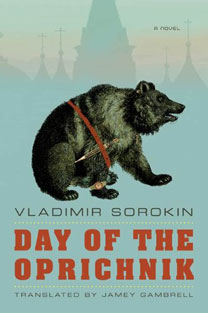 |
| Source: Amazon.com |
When it comes to dystopia, we can’t leave out Sorokin, a modern giant of Russian literature who has been writing in this genre for a decade. “The Day of the Oprichnik” portrays Russia in 2027, a country that has become a twisted, military dictatorship in the style of Ivan the Terrible where the population is terrorized by the Oprichniki, the medieval secret police. The political satire is enhanced by the novel’s stylized prose that mimics archaic Russian, and the many historical parallels in the book emphasize the fact that Russia has, in fact, not changed at its core and has the same attitude to its people.
The novel was followed by its sequel “The Sugar Kremlin.” The books have won prestigious awards in Russia and were nominated for the International Booker Prize in 2013.
5) “The Slynx” Tatyana Tolstaya
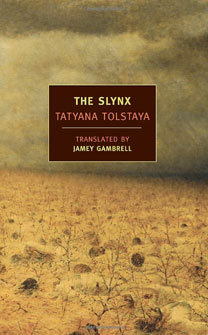 |
| Source: Amazon.com |
Tolstaya a living master, the golden standard for the Russian language. She presents the world after a nuclear
The few books found after the Explosion are taken from people and stored in a book depository, where Benedict, the main protagonist, works. He reads books and copies them by hand to preserve them – randomly, from children’s literature to specialized technical guides. Just because he reads a lot does not mean he understands what is written, and Benedict is unable to educate himself enough to see the world around him; despite being obsessed with books, he still lives like a caveman. So, the people who govern and have access to all the information don’t necessarily preserve our culture.
6) “The Yellow Arrow” Victor Pelevin
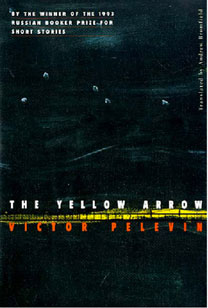 |
| Source: Amazon.com |
Pelevin is another towering figure in Russian postmodern literature and has written a couple of dystopian works. “The Yellow Arrow” is a railway-themed allegorical novella. The train, a metaphor for Russia, which encompasses the entire world for all the characters, is heading towards a collapsed bridge. If Russia has ever known quiet periods, they were just ebbs, a time when worries briefly receded before the coming tsunami.
Grigory Ryzhakov is passionate about promoting Russian literature abroad and is also a writer himself. Read about his latest projects at ryzhakov.co.uk
All rights reserved by Rossiyskaya Gazeta.
Subscribe
to our newsletter!
Get the week's best stories straight to your inbox